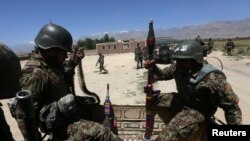KABUL —
A top Afghan security official says the Taliban are not capable of disrupting Saturday's nationwide presidential runoff election.
Amid threats of violence aimed at disrupting the crucial June 14 vote, Independent Elections Commission (IEC) officials have prepared some 6,356 polling centers for operation, while 813 will remain closed due to high level threats and fear of attacks by insurgents — especially in the country's restive south and in some central and western provinces.
IEC deputy commissioner Abdul Rahman Hotaki told VOA's Dari service that high voter turnout in April's first round election prompted officials to increase the number of polling stations and print additional ballots.
Diminished insurgency
National Directorate of Security chief Rahmatullah Nabil said Afghan security forces gained intelligence responding to threats ahead of the April 5 vote, and that insurgents haven't had adequate time since then to plot new attacks.
Nabil also said Taliban threats are merely for propaganda purposes and show that the insurgents are desperate, adding that divisions among Taliban ranks in Pakistan have affected their ability to launch any major attack inside Afghanistan.
But Atiqullah Amarkhail, a retired Afghan general, calls Nabil's optimism premature, saying there could be a security lapse on election day. He agreed, however, that divisions within Taliban ranks could be advantageous to Afghan security forces.
There are reports that a number of Taliban commanders are willing to negotiate with the Afghan government, but a hardcore leadership prevents them from doing so, leading to further divisions.
ISI accusations
Amarkhail claims that plots to disrupt the Afghan elections are planned by the foreign intelligence — a vague reference to the ISI, Pakistan's spy agency. He said Pakistani intelligence has trained numerous groups in Afghanistan to achieve its objectives, and that these groups can easily substitute for Taliban militants. Pakistani officials have long denied any such involvement.
Mirdad Khan Nejrabi, who heads the internal security commission of Afghanistan's parliament, also accuses Pakistani intelligence of sending armed militants into Afghanistan to disrupt the elections. The Afghan MP says the presence of such militants will challenge the Afghan security forces and result in more security incidents.
Nabil told VOA Dari that Afghanistan has provided solid evidence to Pakistani intelligence on the whereabouts of the militants — but the militants then move to safer locations.
There is a common belief, however, among officials, analysts and civilians that, despite security concerns, large numbers of Afghans will go to polling stations and elect their new president in the first ever democratic transfer of power in the county's history.
Amid threats of violence aimed at disrupting the crucial June 14 vote, Independent Elections Commission (IEC) officials have prepared some 6,356 polling centers for operation, while 813 will remain closed due to high level threats and fear of attacks by insurgents — especially in the country's restive south and in some central and western provinces.
IEC deputy commissioner Abdul Rahman Hotaki told VOA's Dari service that high voter turnout in April's first round election prompted officials to increase the number of polling stations and print additional ballots.
Diminished insurgency
National Directorate of Security chief Rahmatullah Nabil said Afghan security forces gained intelligence responding to threats ahead of the April 5 vote, and that insurgents haven't had adequate time since then to plot new attacks.
Nabil also said Taliban threats are merely for propaganda purposes and show that the insurgents are desperate, adding that divisions among Taliban ranks in Pakistan have affected their ability to launch any major attack inside Afghanistan.
But Atiqullah Amarkhail, a retired Afghan general, calls Nabil's optimism premature, saying there could be a security lapse on election day. He agreed, however, that divisions within Taliban ranks could be advantageous to Afghan security forces.
There are reports that a number of Taliban commanders are willing to negotiate with the Afghan government, but a hardcore leadership prevents them from doing so, leading to further divisions.
ISI accusations
Amarkhail claims that plots to disrupt the Afghan elections are planned by the foreign intelligence — a vague reference to the ISI, Pakistan's spy agency. He said Pakistani intelligence has trained numerous groups in Afghanistan to achieve its objectives, and that these groups can easily substitute for Taliban militants. Pakistani officials have long denied any such involvement.
Mirdad Khan Nejrabi, who heads the internal security commission of Afghanistan's parliament, also accuses Pakistani intelligence of sending armed militants into Afghanistan to disrupt the elections. The Afghan MP says the presence of such militants will challenge the Afghan security forces and result in more security incidents.
Nabil told VOA Dari that Afghanistan has provided solid evidence to Pakistani intelligence on the whereabouts of the militants — but the militants then move to safer locations.
There is a common belief, however, among officials, analysts and civilians that, despite security concerns, large numbers of Afghans will go to polling stations and elect their new president in the first ever democratic transfer of power in the county's history.




